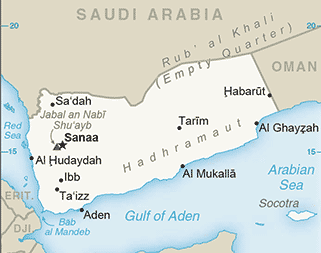
A prospective massive spill from an abandoned oil tanker in the Red Sea could lead to catastrophic public health effects in war-torn Yemen and neighboring countries unless urgent action is taken, according to a study led by researchers at the Stanford University School of Medicine. The FSO Safer is one of the world’s largest tankers and is anchored five nautical miles (approximately nine kilometers) off the coast about 60 kilometers north of the port of Hodeidah, a key lifeline for aid supplies to much of Yemen’s population. It holds 1.1 million barrels of oil—more than four times the amount spilled in 1989 by the Exxon Valdez. Abandoned since 2015 due to the conflict in Yemen, the dilapidated vessel is increasingly likely to leak oil due to deterioration of its hull, or to catch fire through the build-up of volatile gases or through a direct attack.
Currently, the Safer is in waters under the control of the Houthi rebels. Despite the impending emergency, negotiations between the United Nations and the Houthis to inspect and repair the Safer have stalled, and no long-term solutions, such as offloading the oil, have been publicly proposed. (Stanford Medicine News Center, Greenpeace)
Ben Huynh, lead author of the Stanford study, warned that the closure of Yemen’s ports due to a devastating spill from the Safer could mean “millions of people will go without food and clean water—10 million people in terms of drinking water, around 8 million in terms of losing food. If you’re asking about ecological or environmental damage, that’s the entire Red Sea region. So that’s hundreds of millions of people.” (PRI)





Race against environmental disaster off Yemen
The United Nations has signed a memorandum of understanding with Yemen’s Houthi rebels aimed at warding off an environmental disaster at the stranded FSO Safer oil tanker. However, the MoU makes clear that efforts to remove more than a million barrels of crude from the tanker off the country’s coast are contingent on the UN’s ability “to mobilize the necessary funds.” (TNH)
UN operation begins to salvage stricken oil tanker off Yemen
After nearly two years of “political groundwork, fundraising, and project development,” in the words of UN chief António Guterres, the UN-led operation to avert environmental disaster in the Red Sea of the Yemeni coast, is fully underway.
The task of transferring a million barrels of oil from the stricken supertanker Yemen, will take some 19 days—hopefully preventing what would be the fifth largest spill in history, were the rusting tanker to break apart.
But this process will not end with the oil transfer, because the FSO Safer will continue to pose an environmental threat, the UN is warning. And an additional $22 million in funding is still needed to finish the job. (Jurist)